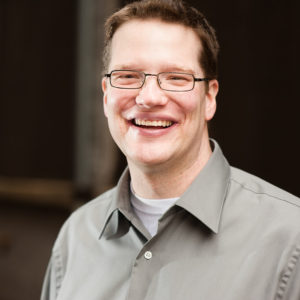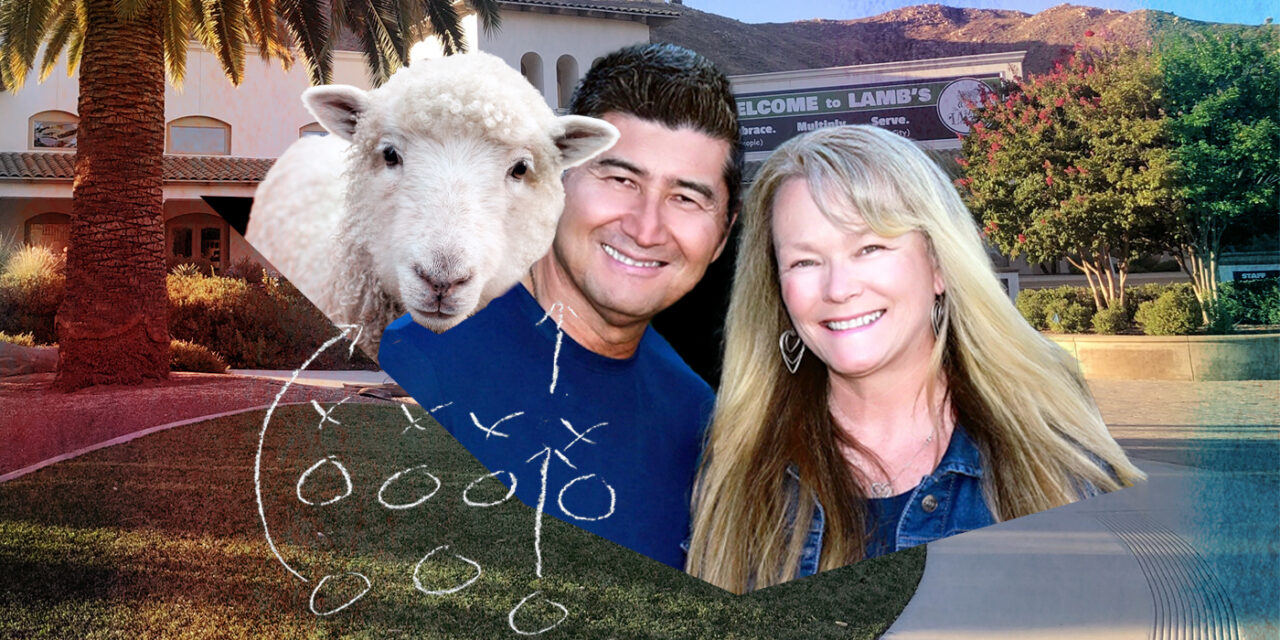
Jeff Finley
Light + Life Executive Editor
Jeff Finley is this magazine’s executive editor. He joined the Light+Life team in 2011 after a dozen years of reporting and editing for Sun-Times Media. He is a member of John Wesley Free Methodist Church where his wife, Jen, serves as the lead pastor.
by Jeff Finley
Mike Chong Perkinson was born in South Korea where he lived for the first seven years of his life. Then his family came to the United States and moved around before finally settling in Idaho where he met the Lamb of God, Jesus Christ, at the start of his teen years.
“I came to faith at 13. I was the first in my family to get introduced to Jesus,” said Perkinson — now the lead pastor of The Lamb’s Fellowship in Lake Elsinore, California — during an interview with Light + Life. “My dad was a pretty devout alcoholic, and he was the American side of my home and had a United Methodist background, but it was nothing more than an affiliation. My mom was the Asian side of my house. She was from Korea — half-Chinese, half-Korean — and Buddhist.”
His newfound faith didn’t come from childhood training.
“I had no idea who Jesus was. All He was to me was a name in a list of expletives,” he said.
But someone shared the gospel with him. The presentation was not an ideal representation of the salvation message. Instead it was based partially on a reference to locusts in Revelation.
_
“I had no concept of Christ fully other than He’s going to protect me from the big, bad bugs.”
_
“The guy brutalized the story of the gospel. The snapshot is he was telling me that if I don’t accept Jesus, I’m going to go to hell, and these large bugs are going to eat me forever, but they won’t swallow me. They’ll chew me up, and then I’ll keep getting put back together,” he said. “I had no concept of Christ fully other than He’s going to protect me from the big, bad bugs.”
Despite the questionable theology of the person witnessing, Perkinson said, “I came to Christ somehow in that. I started reading my Bible.”
However, he struggled to understand what he read in Scripture. While attending “a pretty radical Pentecostal church,” Perkinson said, “a man came and had a marvelous prophetic gift, and I was just enamored by it and him. I said to the Lord as a young kid fairly new in all of this, ‘Whatever that is that he does, I’d like to do that.’”
A year later, “I felt the Lord start to confirm that calling to me both as I was praying every night and by four or five people telling me I was called to ministry. I was 14 at the time and had no concept what that meant,” Perkinson said.
By the time he was 16, he said, “I was pretty radically sure I was called. … I just wanted to serve Jesus with everything I had.”
He didn’t know if this call meant he would be a pastor in a church, but he knew he needed to share his faith.
“I just told everybody about Jesus in my school. I was an athlete and a fairly popular kid, so I did a 180 and flipped. People did not know what to do with me,” said Perkinson, who had a friend who was part of the Church of the Nazarene. Despite some theological disagreements, “we went house to house to all of our friends, knocked on the doors, and shared Jesus with them. We chased people down on our bikes. It was crazy bold.”
Times of boldness, however, were countered by times of doubt.
“I’d backslidden too. When my parents divorced, I got really hurt by God. I thought He had failed me,” Perkinson recalled. “I don’t know how to be lukewarm so I’m going to be pretty radical for Jesus or radical the other way.”
He began basing his identity on sports, but then he returned to Christ and looked at how he could incorporate his love of sports with his love of the Lord. He prayed, “I’ll get a scholarship. I’ll go play football. Hopefully, I’ll make it to the pros, because You surely need people who get to the pros, get famous and then preach the gospel. I’d like to do that.”
He took a scholarship at a community college with the goal of playing football and then possibly transferring to a Bible college later.
“Everything was paid for. I bought a new car, and I was there 10 days. I was so convicted. I just knew I wasn’t supposed to be there,” he said. “I was mature enough at that point to understand I didn’t really love the game of football.”
He decided to leave college football behind and transfer to a Bible college (now known as Bushnell University) in Eugene, Oregon, that his pastor had attended. That pastor also connected him with a large church in Eugene that was affiliated with the Foursquare denomination, and he became involved in youth ministry and also met Teresa, who is now his wife of 38 years.
_
“For whatever reason, God has decided I should move a lot.”
_
After earning his Bachelor of Arts degree in pastoral ministries, he enrolled in Fuller Theological Seminary in Pasadena, California, where he earned a Master of Arts degree in historical theology. While in seminary, he started a Bible study.
“I was going to disciple three guys. That morphed into 100 people. That turned into a church plant,” he said. “It was just really a divine accident.”
That church in Newport Beach, California, still exists today, but instead of staying with the congregation, he opted for what he described as “a life of transient ministry. For whatever reason, God has decided I should move a lot, which probably fits in the old Methodist process. I planted four churches in the next several years.”
The Foursquare Church asked him in 1999 to become the church development coordinator for a district (similar to a Free Methodist annual conference) while continuing as a senior pastor.
“Our district was 230 churches, so we started planting 15 to 30 churches a year and then helping redevelop churches,” said Perkinson, who added that he became part of the denomination’s national team working with church growth expert Bob Logan.
Helping Others Follow the Call
After Perkinson and others spoke out against denominational practices that later resulted in a headline-making scandal, Logan invited him along with Foursquare colleague Tom Johnston to work for Logan’s church coaching and multiplication organization. Logan gave them a landing place, but he didn’t make it a long-term placement.
“Bob basically said after about a year or two of some publishing work with him and some training work: ‘You guys need to go solo and go out. God has you for the body of Christ,’” Perkinson said.
Johnston and Perkinson started the Praxis Center for Church Development.
“We launched out in 2003 as just a church planting group. It was just going to help people do organic church planting,” Perkinson said. “That morphed into more of a holistic church redevelopment process. We started doing extensive development and training for people internationally and locally that led into a discipleship development training center.”
The center is now the Trivium Institute for Leader Development. According to Perkinson, Trivium is primarily intended for people who cannot afford Christian universities or seminaries and who are called to continue serving in their local congregations.
“The distinguishing part of Trivium is that we wanted to mentor local pastors and leaders,” he said. “If you were in Trivium, you’d have to have a mentor that we trained that understood the rabbinical practice of pouring in and pouring out and drawing out — walking you through the rabbinical process of developing pastors who live the life and can multiply and create more pastors, leaders and disciples who create more disciples.”
While now leading Lamb’s Fellowship, Perkinson continues to serve as the co-president of Trivium and the senior developer of Praxis.
_
“Everybody has a call.”
_
When asked about helping people find their calling, he cited Galatians 4:19, “My dear children, for whom I am again in the pains of childbirth until Christ is formed in you.”
“I think moms and dads are called to help form Christ in their kids and hopefully get them introduced to Christ,” he said. “Everybody has a call.”
Some people are called by God to the business world or the arts while others are called to work for the church.
Perkinson said that all Christians “have the same Jesus in us,” and we “all have a unique incarnation of Him” as revealed through “the way that He expresses Himself through us and the unique gift, personalities and wiring He’s given us. I think first and foremost, it’s our objective to help people discover that, and the best way to discover that is to learn to grow in relationship with your Father in heaven. We’re first sons and daughters before we’re servants and stewards.”
Finding Free Methodism
Perkinson said that as he studied church history, he “was enamored with [John] Wesley from the get-go.” He also became a fan of theologian Bill Lane who taught at Western Kentucky University and Seattle Pacific University.
“Bill was a Free Methodist scholar, and so I got introduced to Free Methodists way back in the late 1980s,” he said. “I’d visit him up at Seattle Pacific and got exposed to the denomination, which was really intriguing to me.”
He joined the Free Methodist Church USA in 2014 when he was asked to lead New Heights Christian Fellowship in Boise, Idaho, through a time of transition. He was told he could keep his Foursquare ordination while leading the Free Methodist congregation, but he decided, “If I’m going to pastor a church, I want to be part of the family.” His wife, Teresa, also transferred her ordination from Foursquare to Free Methodist.
After a couple of years in Idaho, he left ministry in the FMCUSA for four years to lead the successful revitalization of a nondenominational church in Montana. In October 2020, he returned to the denomination to become the lead pastor at The Lamb’s Fellowship that had experienced staff changes and other challenges in addition to the COVID-19 pandemic.
“Lamb’s had been on a pretty progressive decline for the past three years. They’d been declining each year numerically and financially, ” he said. “There was a fairly good cliff that happened between January and February 2020. It dropped significantly, and then, of course, in March they stopped meeting.”
_
“I’d just left a great situation to walk into a really hard one.”
_
In-person worship ceased in all California houses of worship because of COVID-19 restrictions. Lamb’s Fellowship worked to develop online services in the midst of not having a lead pastor.
“When I got here, they were technically about seven months without a pastor,” he said. “I’d just left a great situation to walk into a really hard one.”
Perkinson wondered if Lamb’s Fellowship would be a congregation of small attendance in a large church building. He worked to bring healing and discipleship to the church staff as the congregation revived. Then “major sin patterns” within the congregation were exposed last fall.
“Within a five-week span, three major things hit that could have just tanked the church,” said Perkinson, who added that people remained faithful to the church despite the unexpected struggles. “While that’s all going on, we baptized 79 people last year, and people were coming to the Lord and coming to the church even though it was hit and miss [with in-person worship] because of the pandemic.”
Finances remained a challenge, but “we just stayed the course and loved on people,” he said. “I had a revelational moment with the Spirit where it felt like the Lord was saying, ‘You’ve been playing defense for the last 14 months.’ … I just felt the Lord, using a sports metaphor, invite me to switch sides of the ball and play offense.”
Concern about the church’s future has given way to hope and excitement evidenced when the congregation recently held its annual society meeting.
“It was the largest one that Lamb’s has ever had,” he said. “It’s a great new season right now.”
Serving the City
Lamb’s Fellowship committed to its simple mission: “Embrace people, multiply disciples, and serve the city.”
The congregation has a longtime reputation of serving Lake Elsinore. Plans to benefit the community include potentially adding an athletic field and gym on church property and then donating them to the city for citywide use. The church building already is used for many community events, and church events also are a draw for thousands of people who don’t otherwise attend Lamb’s Fellowship.
“We do a car and bike show here that has just morphed into this massive thing. Last year was the biggest one we ever did, and we were still under restriction (for COVID-19). We had 340 really classic cars and bikes registered,” he said. “Lake Elsinore considers our car and bike show one of the top 10 events in the city.”
The city government honored the church for its service to the community through hosting the car and motorcycle show, and the mayor filmed a video supporting the show that raises money for local youth programs.
Lamb’s Fellowship launched a preschool in October 2019, but it closed when the pandemic arrived in March 2020. The church “reopened it in August 2020 with 12 kids, and we have 100 now,” he said. “It just blew up this last year. It’s kicked us all out of offices. We’re all trying to find space, and it’s a wonderful mess, and that’s been a really big plus.”
The congregation continues to partner with the Lake Elsinore Dream Center, which began as a church plant from Lamb’s and has a mission to “restore and rebuild the people and property of Lake Elsinore physically, emotionally, and spiritually.”
“We’re engaging in a lot of ways to bless our city and provide things for our city,” he said. “It’s ignited the heart of people, so we’re seeing some increase finally in lots of new people and a lot of people coming back to Christ. We’re seeing some families get restored.” +

Jeff Finley
Light + Life Executive Editor
Jeff Finley is this magazine’s executive editor. He joined the Light+Life team in 2011 after a dozen years of reporting and editing for Sun-Times Media. He is a member of John Wesley Free Methodist Church where his wife, Jen, serves as the lead pastor.








